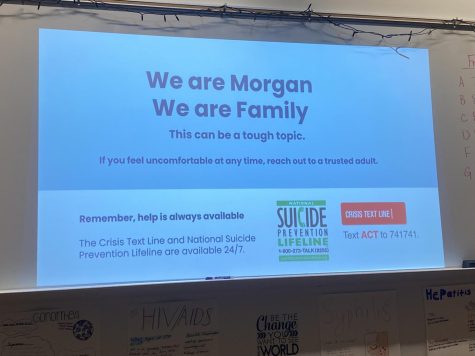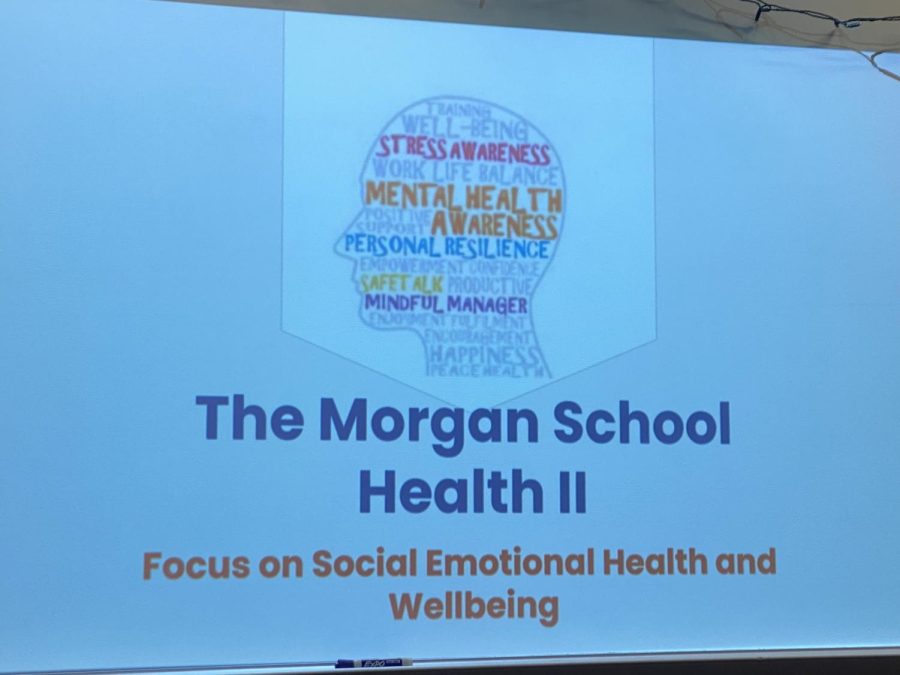Mental Health Issues In Students
Fighting The Stigma
Mental health of high school students is becoming a larger issue every day. As a result of teenagers being consumed in social media in the United States, The Department of Health and Human Services states that a little under 50% of teenagers are suffering or have suffered from some type of mental illness. These illnesses include but are not limited to, anxiety, depression, ADHD, and eating disorders. As teenagers, talking about such a serious topic can be scary and evoke a vulnerable state that challenges their mental health. This forces the students to struggle in silence, unaware that they even need help. Since there is a large stigma around struggling with mental health, many students are ashamed or embarrassed and refuse to admit that they need support.
Morgans’ health teacher, Rachel Lupone, has been able to teach her students about mental health and makes it much easier to discuss. Being able to study students’ actions firsthand, Mrs. Lupone has noticed a lot of changes, especially after the shut-down due to Covid-19. The transition from in-person to online school created so much stress and confusion that has carried to the following school years. Mrs. Lupone stated that she has noticed an increase in anxiety with students during her time at Morgan. She also agrees that social media has played a huge role in this and the “constant information (positive and negative) is too much to handle.” She estimates that 80-85% of students at Morgan struggle with some form of mental health. Many are afraid to reach out and connect to adults because of the age gap and a fear that adults won’t understand.
Secretary of the Morgan support staff Karyn O’Beirn also agreed that “Social media has taken a negative toll on everyone.” because “connection is important… We need to connect to other people.” The Morgan Counseling Department makes sure it’s clear to students that they are here to help and give support. The students should utilize their resources, even if it’s uncomfortable. To help with this, every Wednesday, the school offers a block called “Wellness Wednesday” during advisory to give students time to prioritize their mental health by going to see a counselor or getting help on school work that they might be behind on. 
Morgan’s social worker Maureen Tranquilli, and psychologist, Sara Thomas, play a big role in helping students who are struggling. They stated that they mainly focus on students with 504 plans, however, students can set up meetings with them if they do not have a plan. Friends, students, and teachers can refer students whose mental health is interfering with their academics. They also advertise their names and emails on the Morgan website, and on a bulletin board in the school, so students can match their names and faces. From there, they try to set students up with counseling outside of school if needed. Due to the fact that the counseling department is mainly females, they give students the opportunity to see male therapists and social workers outside of school if that raises their comfort. Although the department is all females, Mrs. Thomas said that her students are “around 75% male”, meaning male students feel comfortable reaching out. Both Mrs. Tranquilli and Mrs. Thomas agree that bringing back group sessions will maximize mental health support at Morgan, and lower the anxiety about school.
Mrs. Tranquilli and Mrs. Thomas expressed that they noticed time frame patterns in students who reach out for help. This includes freshmen before midterms, juniors nearing junior portfolio, and seniors going through their college application process. These pivotal times in students’ high school journeys have proven to increase stress levels and anxiety. The support staff is there to provide reassurance and validation, making sure they understand that stress is normal and there is a way to deal with it. 
On Friday, January 13th, Mrs. Lupone and Mrs. Tranquilli held a mental health presentation in the junior health classes. They discussed signs that a student might be struggling and how to reach out for help. They also gave the opportunity during the presentation to turn in a slip of paper to guidance, notifying them that they or a student at Morgan was struggling and needed help. If the student turned a slip in, the guidance department set up a meeting with the student immediately to figure out a solution.
According to the National Institute of Mental Health, men are less likely to show obvious signs of mental health struggles. Mrs. Lupone thinks this is caused by societal norms and the idea that men often hide their emotions. Chances are men and women struggle the same amount, but women are more inclined to seek help. Mrs. Lupone thinks Morgan as a community should work on making a safer environment for students to discuss their struggles and advocate for help when needed. She knows it’s important to have “open and honest conversations.” This also means the students should feel welcomed and free of judgment when they open up to authority figures at the school. To help with this, she suggests the mental health curriculum being taught should be genuine and easy for the students to relate to.


